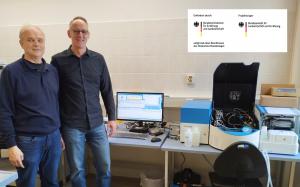New research project investigates protein processing from insects for sustainable food production
HENNIGSDORF, GERMANY, April 23, 2025 /EINPresswire.com/ -- In light of global population growth, science and industry are intensively searching for sustainable solutions to feed humanity.
One promising opportunity lies in the use of alternative protein sources – for example, from insects.
The "ProtinA" project (full title: Nutritionally Optimized Development of Alternative Protein Sources through Innovative and Sustainable Processing Technologies Using Crickets (Acheta domesticus) as an Example) combines the expertise of the Leibniz Institute of Agricultural Engineering and Bioeconomy (ATB) in Potsdam, the German Institute of Human Nutrition, and three industrial partners, including membraPure GmbH.
The aim of the project is to analyze and optimize different processing methods for alternative protein sources using crickets as a model organism. A key focus is on how the technological processes affect the nutritional quality of the resulting foods.
The results should not only be scientifically usable but also demonstrate concrete practical applications. A central element of the project is the precise control of the processing processes.
The project is investigating how individual process steps affect protein structure and function.
"An important aspect is the amino acid composition. To capture this, we are developing a standardized protocol for sample preparation and quantification," explains Dr. Alexander Angersbach, an employee at membraPure GmbH and responsible for coordinating amino acid analysis.
The processing strategies developed in the project are designed to ensure that the bioavailability of the proteins—that is, their usability by the human body—is preserved as completely as possible.
This will be tested both in test tubes (in vitro) and in biological models (in vivo) to gain a holistic understanding of the relationships between processing and nutrient effects.
Furthermore, targeted control of individual steps prevents food from being unnecessarily processed. This not only protects product quality but also contributes to resource conservation and thus to ecological sustainability.
"Our research approach ranges from alternative animal raw materials through the individual processing steps to the nutritional evaluation of the final product," says Dr.-Ing. habil. Oliver Schlüter, head of the ATB program area "Healthy Foods."
"Initially, we are focusing on liquid, protein-rich food systems, followed later by dry product forms."
The project leaders are confident that the findings gained within the framework of ProtinA will be transferable to other alternative protein sources and various product classes in the future.
In this way, innovative, nutrient-rich, and sustainable foods could be created in the long term that are also accepted by consumers. The research project is funded by the Federal Ministry of Food and Agriculture (BMEL) as part of the Innovation Funding Program (funding reference number: 281A809B21) and supported by the Federal Office for Agriculture and Food (BLE).
Dr. Alexander Angersbach
membraPure GmbH
a.angersbach@membrapure.de
Visit us on social media:
LinkedIn
Instagram
YouTube
Legal Disclaimer:
EIN Presswire provides this news content "as is" without warranty of any kind. We do not accept any responsibility or liability for the accuracy, content, images, videos, licenses, completeness, legality, or reliability of the information contained in this article. If you have any complaints or copyright issues related to this article, kindly contact the author above.

